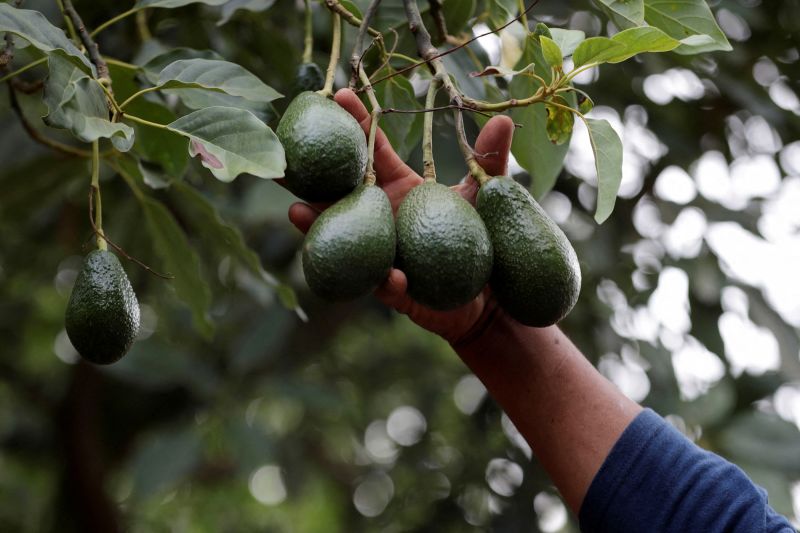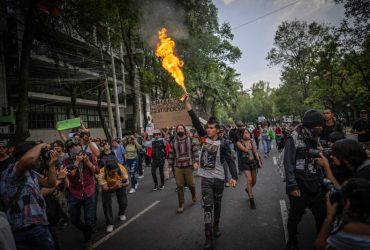When two US avocado inspectors were assaulted and detained at a police roadblock in the Mexican state of Michoacán last month, it sparked a costly international crisis.
The US paused all avocado imports from the state for more than a week, leaving Mexican growers out of tens of millions of dollars and temporarily sending the price of a carton of the fruit in the US soaring by 40 percent, according to analysis firm RaboResearch Food & Agribusiness.
Weeks later, after diplomats and agricultural officials from both countries negotiated new security guidelines around inspections, the massive cross-border trade has stabilized, with the US Department of Agriculture saying that export levels returned to normal at the beginning of July.
But the episode underscored the precarious nature of the industry and the immense volatility in a region that provides most of the world’s avocados, one of Mexico’s most dangerous states and a nexus of cartel power.
US and Mexican officials are now considering new changes to the strict processes that direct how the fruit can make its way to American kitchens to meet ever-increasing demand, with industry groups and advocates urging for more oversight.
‘Green gold’
Avocados, the creamy fruit with the industry nickname “green gold,” are big business. Of the amount exported from the nearly 2.7 million metric tons of the fruit grown last year in Mexico, 81 percent went to the US, at a value of $2.7 billion.
Nearly three-quarters of Mexican avocados come from Michoacán, a state along the country’s Pacific coast with a volcanic belt running through it that makes its soil ideal for farming. The state’s deepwater port has also been critical for the flourishing of drug cartels, which moved into Michoacán in the 1980s, fueling a homicide rate that is today more than twice the national average.
The expansion of the avocado market in the state around the same time has been “deeply intertwined” with the violent groups and corrupt public authorities, researchers at the Global Initiative Against Transnational Organized Crime said in a report this year.
Citing interviews with growers in the state, the researchers described how criminal groups illegally burn and log protected forests and bribe local officials to change permissions around the use of the land to allow for commercial activity. According to an academic article published by the Mexican government cited in the report, 80 percent of the avocado orchards in Michoacán were established illegally, “initially through unauthorized land use that was then turned into legal parcels thanks to corruption of public authorities.”
Cartels today also regularly extort producers in protection schemes, the report found. Local police forces in turn commonly rent themselves out as security for producers, and heavily armed militias known as “autodefensa” groups have formed to patrol farms.
“This is the core of the mafia-style relationships that exist in Michoacán around avocado production,” Romain Le Cour, one of the report authors and a senior expert at the initiative, said in an interview. “You need criminal actors in a way to stir up the business, you need business entrepreneurs to run the business, and you need corrupt authorities to make sure that what you’re doing becomes legalized or laundered.”
Mexican officials in the aftermath of the detention of the inspectors in June were quick to downplay the incident, claiming it was nonviolent and unrelated to organized crime and the inspectors’ work in the avocado industry.
The inspectors, who were Mexican citizens working for the USDA Animal and Plant Health Inspection Service, were stopped and taken from their car after attempting to cross a barricade on a highway set up by police officers who were protesting a pay issue, according to Alfredo Ramírez Bedolla, the Michoacán governor.
A dangerous job
Since the US first allowed imports of avocados from Michoacán in 1997, APHIS employees in the country have inspected avocado orchards to ensure they are free of pests that could harm US avocado crops. About 100 inspectors from the agency operate within the state, according to Ramírez, visiting avocado groves and packing facilities to check the fruit before issuing a certification.
That close contact and pivotal responsibility leaves them “extremely exposed to corruption and violence,” said Le Cour, the GI-TOC expert.
In 2022, exports of Mexican avocados were similarly halted for several days after one of the US inspectors working in Michoacán received a threatening phone call.
In the wake of both incidents, Mexican leaders have pushed to change the bilateral agreement regulating the trade to allow for the Mexican government to take over the inspections, with Mexican President Andres Manuel Lopez Obrador criticizing the US decision to halt the export as “arrogance.”
In a news conference last month, Mexican Agriculture Minister Victor Villalobos said the Mexican government was “perfectly prepared” to do the work, which he said would be valuable to “avoid having to stop the export.”
Officials at the US State Department and USDA have considered the possible change, according to Ken Melban, the vice president for industry affairs and operations at the California Avocado Commission, which represents growers in the state.
In a statement, Melban called it “unimaginable the US government would consider abdicating inspection responsibilities to Mexico.”
“US farmers will not be protected under such a program, one intended and designed specifically to protect US farmers’ economic interests,” he said.
An APHIS spokesperson declined to comment on the thinking around the policy.
US and Mexican officials have also recently resurfaced discussions around a policy to block the export of avocados from Mexico grown in orchards on illegally cleared lands, according to Brad Adams, the executive director of Climate Rights International, an advocacy group that used satellite imagery last year to document the widespread deforestation behind the market.
Instead, the agency pointed towards training and technical assistance that the US Forest Service has provided to Mexico “to support real-time deforestation monitoring of priority regions.”
“We’ve exposed something that is illegal and therefore indefensible,” Adams said. “They have an obligation that they recognize at a governmental level in Mexico, and the US can’t keep importing illegally harvested produce.”









